Introduction
The Ryzen 5 7600 is a very popular Ryzen 7000 CPU thanks to its low price and firm performance in modern games. The Ryzen 5 7600 is particularly impressive as a budget CPU because it can cope with the demands of 1440p and 4K gaming when paired with the right graphics card. However, one common mistake people make when purchasing a CPU is determining the correct motherboard for a PC build.
AMD Ryzen 7000 CPUs are compatible with five different chipsets: A620, B650, B650E, X670, and X670E, so shortlisting one particular board out of many is challenging. Furthermore, there is a wide range of motherboards that cater to different budgets and use cases, adding more factors to consider. To make this decision easier, we’ve tested a variety of X670 and B650 motherboards, picking a range of options to recommend for those building a PC with the Ryzen 5 7600 CPU.
The Best Motherboards for the Ryzen 5 7600
1. MSI MPG B650 Carbon WiFi

The MSI MPG B650 Carbon WiFi is the best motherboard for the Ryzen 5 7600, offering a well-rounded set of features for those building a mid-range system. While being well-balanced regarding connectivity and expansion, the MSI MPG B650 Carbon WiFi is also highly affordable, making it ideal for PC builders who are more price-conscious about their component choices. Moreover, the MPG B650 Carbon WiFi is a sleek motherboard that blends well with other dark components.
The MPG B650 Carbon WiFi features strong memory support, allowing RAM speeds up to 7800MT/s with a max capacity of 256GB. Thanks to the PCI-E 4.0 x16 graphics card slot, this board can house RTX 4000 and Radeon 7000 graphics cards. There is also space for a Gen5 SSD and three further Gen4 SSDs, providing plenty of storage upgradeability.
| Specification | MSI MPG B650 Carbon WiFi |
|---|---|
| Form Factor | ATX |
| Supported Memory | 256GB DDR5 7800MT/s |
| PCI-E x16 Slots | 2 x PCI-E 4.0 |
| PCI-E x4 Slots | 1 x PCI-E 5.0 3 x PCI-E 4.0 |
| VRM Power Phases | 16+2+1 |
| Front IO | 2 x USB 2.0 1 x USB 3.2 Gen1 1 x USB 3.2 Gen2 Type-C |
| Rear IO | 2 x USB 2.0 Type-A 7 x USB 3.2 Gen2 Type-A 1 x USB 3.2 Gen2x2 Type-C |
| Audio | 1 x Optical S/PDIF Out 5 x Audio Jacks |
| Networking | WiFi 6E 2.5 Gigabit LAN |
The MPG B650 Carbon WiFi’s rear IO is strong, with ten USB ports. These include two USB 2.0 ports, a singular USB 3.2 Gen2x2 Type-C port, and seven USB 3.2 Gen2 Type-A ports. Audio enthusiasts can leverage an Optical S/PDIF port alongside five further 3.5mm jacks for dedicated speaker setups. Furthermore, the MPG B650 Carbon WiFi offers the choice between WiFi 6E or 2.5 Gigabit LAN, which are ample for lag-free competitive gaming.
The most significant caveat with the MSI MPG B650 Carbon WiFi is the lack of a Gen5 graphics card slot. This will limit upgradeability, restricting GPU choice to PCI-E 4.0-supported graphics cards. However, this won’t be a major issue for those sticking to RTX 4000 and Radeon 7000 graphics cards for the next few years.


Suggested Article: MSI B650M PROJECT ZERO Review
2. MSI MAG B650M Mortar WiFi

Despite its smaller design, the MSI MAG B650M Mortar WiFi is a solid Micro-ATX board that maximises connectivity and expansion. This motherboard offers a fantastic set of rear IO alongside excellent RAM overclocking headroom, making it a great choice for PC builders with high-performance kits. The MSI MAG B650M Mortar WiFi is also very affordable, sitting at around $200 at the time of writing.
Looking at the specs, the MAG B650M Mortar WiFi supports RAM up to 256GB and has a max overclocking frequency of 7600MT/s. Like the MSI MPG B650 Carbon WiFi, this board features a singular Gen4 graphics card slot, accommodating RTX 4000 and Radeon 7000 graphics cards. Due to the Micro-ATX form factor, the number of SSD slots is reduced to two rather than four.
| Specification | MSI MAG B650M Mortar WiFi |
|---|---|
| Form Factor | Micro-ATX |
| Supported Memory | 256GB DDR5 7600MT/s |
| PCI-E x16 Slots | 2 x PCI-E 4.0 |
| PCI-E x4 Slots | 2 x PCI-E 4.0 |
| VRM Power Phases | 12+2+1 |
| Front IO | 2 x USB 2.0 1 x USB 3.2 Gen1 1 x USB 3.2 Gen2 Type-C |
| Rear IO | 4 x USB 3.2 Gen1 Type-A 3 x USB 3.2 Gen2 Type-A 1 x USB 3.2 Gen2x2 Type-C |
| Audio | 1 x Optical S/PDIF Out 5 x Audio Jacks |
| Networking | WiFi 6E 2.5 Gigabit LAN |
Connectivity is much stronger than that of the MSI MPG B650 Carbon WiFi. The MAG B650M Mortar WiFi offers nine USB ports, with no USB 2.0 in sight, making all of the ports on this board USB 3.2 Gen1 or higher. Expanding further, the MAG B650M Mortar WiFi features a full audio suite with optical S/PDIF alongside 2.5 Gigabit LAN and WiFi 6E.
The only major weakness of the MSI MAG B650M Mortar WiFi motherboard is its lack of future upgradeability. Due to its size, the Micro-ATX form factor restricts the number of expansion slots. For those planning to add more SSDs or PCI-E cards, it might be worth considering an ATX board offering more slots for potential upgrades.


3. Gigabyte B650 Gaming X AX

The Gigabyte B650 Gaming X AX is an excellent motherboard that prioritises function over form. While the barebones design isn’t inspiring, the set of features this motherboard offers is worth it for the price point. On the features side, the B650 Gaming X AX offers up to 8000MT/s speeds for DDR5 RAM, which is the strongest we’ve seen compared to other boards in this roundup. This will offer a modest boost to performance in certain applications and games.
Looking at expansion, the Gigabyte B650 Gaming X AX offers a Gen4 x16 slot for graphics cards, accommodating RTX 4000 and Radeon 7000 options. For storage, the Gigabyte B650 Gaming X AX provides three M.2 slots, one of which is Gen5 and the other two are Gen4. While the number of slots on this board is somewhat limited compared to other ATX motherboards, it is great to see the inclusion of Gen5 storage support.
| Specification | Gigabyte B650 Gaming X AX |
|---|---|
| Form Factor | ATX |
| Supported Memory | 192GB DDR5 8000MT/s |
| PCI-E x16 Slots | 1 x PCI-E 4.0 |
| PCI-E x4 Slots | 1 x PCI-E 5.0 2 x PCI-E 4.0 |
| VRM Power Phases | 8+2+1 |
| Front IO | 1 x USB 2.0 1 x USB 3.2 Gen1 1 x USB 3.2 Gen2 Type-C |
| Rear IO | 1 x USB 3.2 Gen2 Type-C 1 x USB 3.2 Gen2 Type-A 3 x USB 3.2 Gen1 Type-A 3 x USB 2.0 Type-A |
| Audio | 3 x Audio Jacks |
| Networking | WiFi 6E 2.5 Gigabit LAN |
Regarding connectivity, the Gigabyte B650 Gaming X AX motherboard comes with eight USB ports, the majority of which are high-speed. These include two USB 3.2 Gen2 ports (a Type-C and Type-A), three USB 3.2 Gen1 Type-A ports and three further USB 2.0 Type-A ports.
The Gigabyte B650 Gaming X AX has three 3.5mm audio jacks for Mic-In, Line-In, and Line-Out, contrasting to the dedicated audio suites on the B650 Carbon WiFi and B650M Mortar WiFi. However, the B650 Gaming X AX provides solid networking choices, featuring WiFi 6E and a 2.5 Gigabit LAN port.
The Gigabyte B650 Gaming X AX’s main flaw is its barebones design. The grey and black heatsinks contrast with the slightly brown PCB, offering a plain aesthetic that won’t appeal to everyone. Those sticking to a specific colour scheme or component style can find alternative motherboards that blend better with darker or lighter-themed setups.


4. ASUS TUF Gaming B650M-Plus

The ASUS TUF Gaming B650M-Plus is a solid, affordable Micro-ATX board. While the TUF Gaming B650M-Plus is a small form factor board, it offers excellent expansion options. The TUF Gaming B650M-Plus features four DIMM slots and supports a max RAM capacity of up to 192GB at a speed of 7600MT/s. While these aren’t the fastest speeds, this will slightly boost performance across games and intense workloads.
The TUF Gaming B650M-Plus offers two Gen4 slots for graphics cards, one running at x16 speeds and the other in x4 mode. This board provides a Gen5 slot for M.2 SSDs, supporting high-speed drives like the Firecuda 540 or the Crucial T700. Alternatively, there are three additional Gen4 M.2 slots for expanding storage options.
| Specification | ASUS TUF Gaming B650M-Plus |
|---|---|
| Form Factor | Micro-ATX |
| Supported Memory | 192GB DDR5 7600MT/s |
| PCI-E x16 Slots | 2 x PCI-E 4.0 |
| PCI-E x4 Slots | 1 x PCI-E 5.0 3 x PCI-E 4.0 |
| VRM Power Phases | 12+2 |
| Front IO | 2 x USB 2.0 1 x USB 3.2 Gen1 1 x USB 3.2 Gen1 Type-C |
| Rear IO | 1 x USB 3.2 Gen2 Type-C 2 x USB 3.2 Gen2 Type-A 1 x USB 3.2 Gen1 Type-A 4 x USB 2.0 Type-A |
| Audio | 5 x Audio Jacks |
| Networking | 2.5 Gigabit LAN |
On the connectivity front, the TUF Gaming B650M-Plus is a bit lacking in high-speed USB ports, with four ports out of the total eight being USB 2.0 ports. However, this board provides three USB 3.2 Gen2 ports and a USB 3.2 Gen1 port for those needing strong transfer speeds. The TUF Gaming B650M-Plus opens up audio options, with five 3.5mm jacks geared towards gamers with dedicated speaker setups. Unfortunately, this board has no built-in WiFi, but the 2.5 Gigabit LAN port is ample for lag-free gaming.
Unfortunately, I’d argue that the most standout con of this board is the rear IO. The lack of onboard WiFi and reduced number of high-speed ports is disappointing. While the dedicated audio suite softens the blow, there are a range of alternative motherboards that offer a better selection of ports on the rear IO.


How We Tested the Best Motherboards for the Ryzen 5 7600
We require a massive amount of data to provide informed product recommendations. Our motherboards are tested rigorously and methodically to ensure we have a big data set to compare and consolidate which boards are worth recommending. When testing motherboards, we consider various factors to ensure that each board offers a strong value proposition for a range of use cases and budgets.
To ensure that all of our testing is fair and repeatable, we’ve published numerous behind-the-scenes articles that detail our testing processes. These articles provide a deep dive into our full benchmarking methodology.
Frequently Asked Questions
Do I Need DDR5 RAM for Ryzen 7000 Motherboards?
Yes, all Ryzen 7000 motherboards, regardless of the chipset, are DDR5-only; DDR4 is not supported.
Can I Overclock the Ryzen 5 7600?
The Ryzen 5 7600 does not officially support overclocking. AMD CPUs supporting overclocking are usually denoted by an ‘X’ at the end of the CPU name.
Does My Motherboard Affect Gaming Performance?
Motherboards do not affect or bottleneck gaming performance, as their purpose is to provide the connectivity and power for your PC build to work.


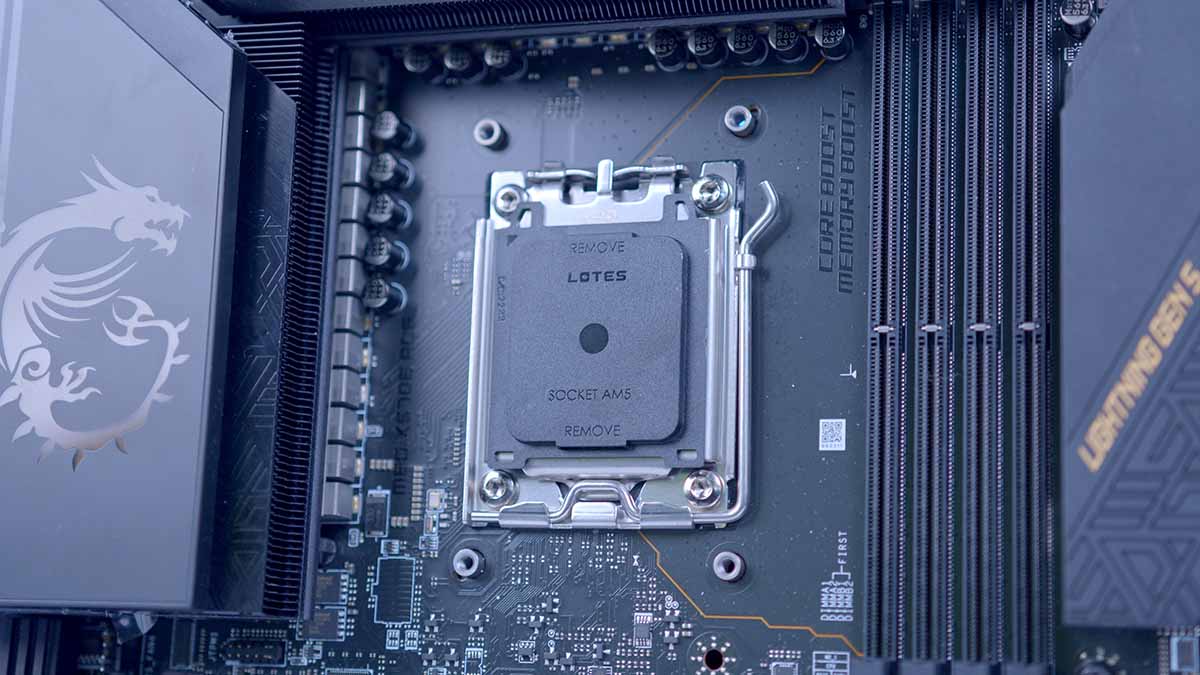
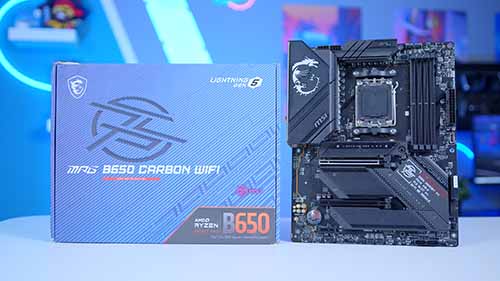




![FI_[DM89] Phanteks Evolv + AORUS 5090 9850X3D Gallery (8)](https://geekawhat.com/wp-content/uploads/2026/02/FI_DM89-Phanteks-Evolv-AORUS-5090-9850X3D-Gallery-8-551x431.jpg)
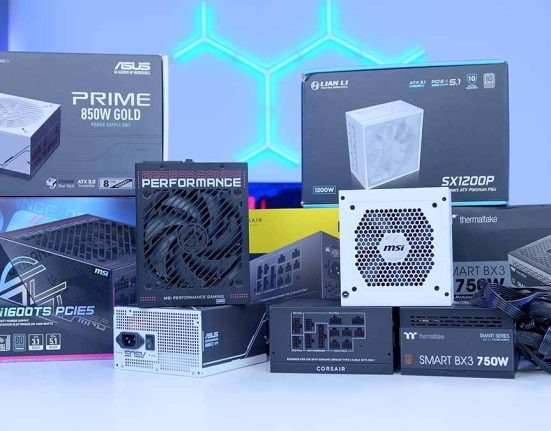
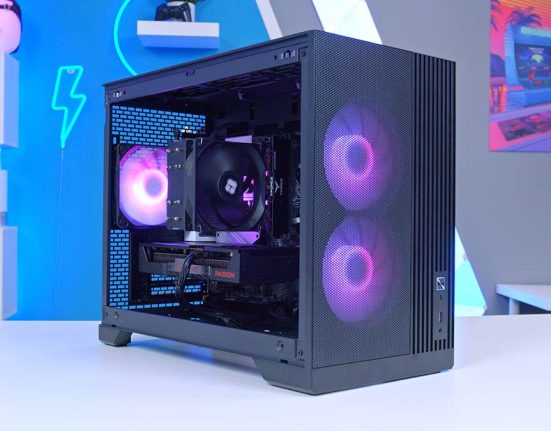
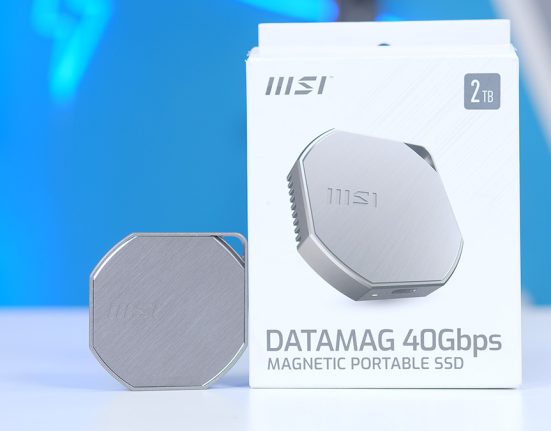
![FI_[DM87] HAVN BF & RTX 5090 Build](https://geekawhat.com/wp-content/uploads/2026/01/FI_DM87-HAVN-BF-RTX-5090-Build-551x431.jpg)
